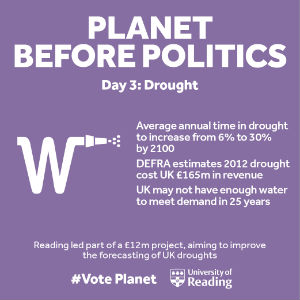#VotePlanet: Drought and bushfires in Australia may be a more common sight under climate change
09 December 2019

Drought conditions like those that have led to raging bushfires in Australia in recent months are likely to become an increasing problem due to climate change, scientists at the University of Reading warn.
Uncontrollable fires are burning across vast areas in New South Wales, with more expected due to ongoing hot, dry weather forecast for the rest of the summer.
Reading Meteorologist Dr Andy Turner says the conditions are due to contrasting ocean temperatures in the Indian Ocean causing drier conditions to the east but wet weather to the west, which has led to deadly flooding in East Africa.
Dr Turner told the BBC that climate change would make these ‘dipole’ events in the Indian Ocean more common in future. He said: "The countries in the west of the Indian Ocean, so on the African coast, are going to see much, much more flooding and heavy rainfall relating to these events.
"You're going to get more damaging impacts on crops and on infrastructure and flooding. On the other hand, in the east of the Indian Ocean, islands on the west side of Indonesia are going to see a greater chance of drought and reduced rainfall."
The University of Reading hosts a range of research into drought and climate change, looking at the effects rising temperatures and changes to rainfall patterns could have on the UK and the rest of the planet in the decades to come.
Reading’s Professor Len Shaffrey led part of the £12m UK Droughts & Water Scarcity research programme, titled About Drought, focusing on improving drought forecasts in the UK. The team presented their findings in November, including a call for everyone to save water, even during wet weather or floods, to prevent drought.
The University’s Walker Institute leads a project helping smallholder farmers increase their resilience to climate risks like drought. The PICSA (Participatory Integrated Climate Services for Agriculture) project supports farmers to use data to make informed decisions.
Two thirds of sub-Saharan Africa’s population depends on small-scale, rain-fed farming as their main source of income, meaning extreme wet or dry conditions, and long-term changes in climate, have a major impact on millions of lives.
Drought also has an impact on UK farming, and was part of the focus of last week’s findings announcement of the five-year Soil Security Programme led by Reading – the biggest ever study into UK soils.
#VotePlanet
The University of Reading’s #VotePlanet campaign is highlighting the biggest threats facing the UK and global environment, as well as how research and action can combat them, in the lead up to the General Election on December 12.
Public concern for the environment has increased significantly in recent years, with political parties unveiling various eco-friendly pledges in their election manifestos.
The #VotePlanet campaign therefore aims to inform voters on the science behind these issues, and what sustainability action it is taking as an institution.
Follow the campaign on Twitter, Facebook and Instagram, and on the University news page. Get involved and share your examples of sustainable action using the hashtag #VotePlanet.
